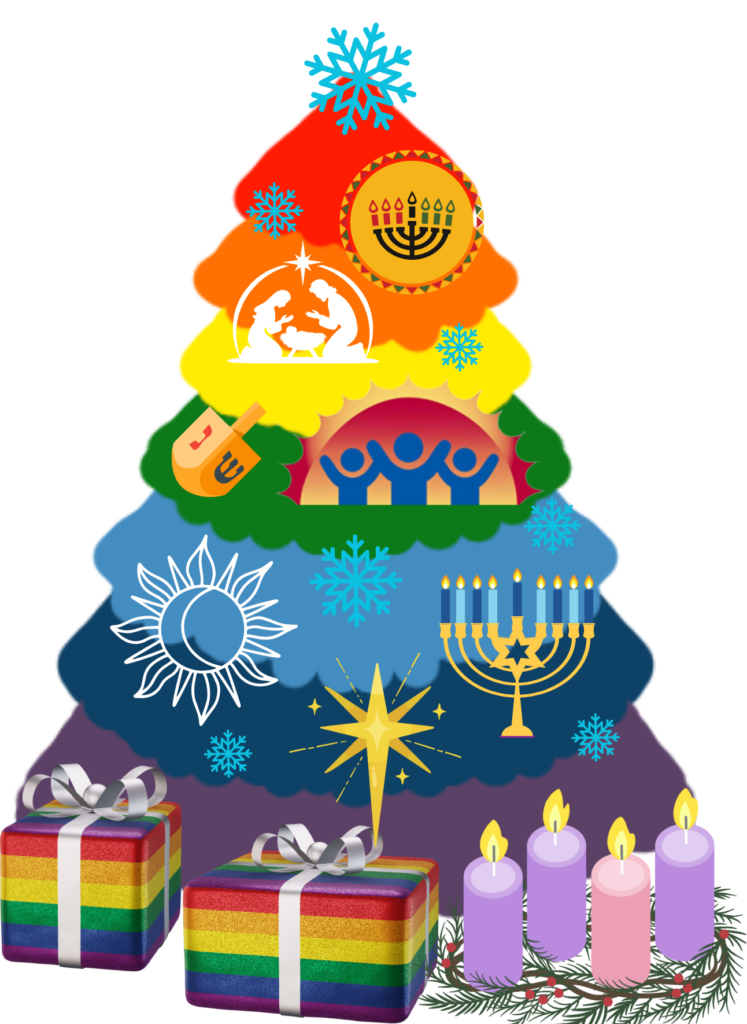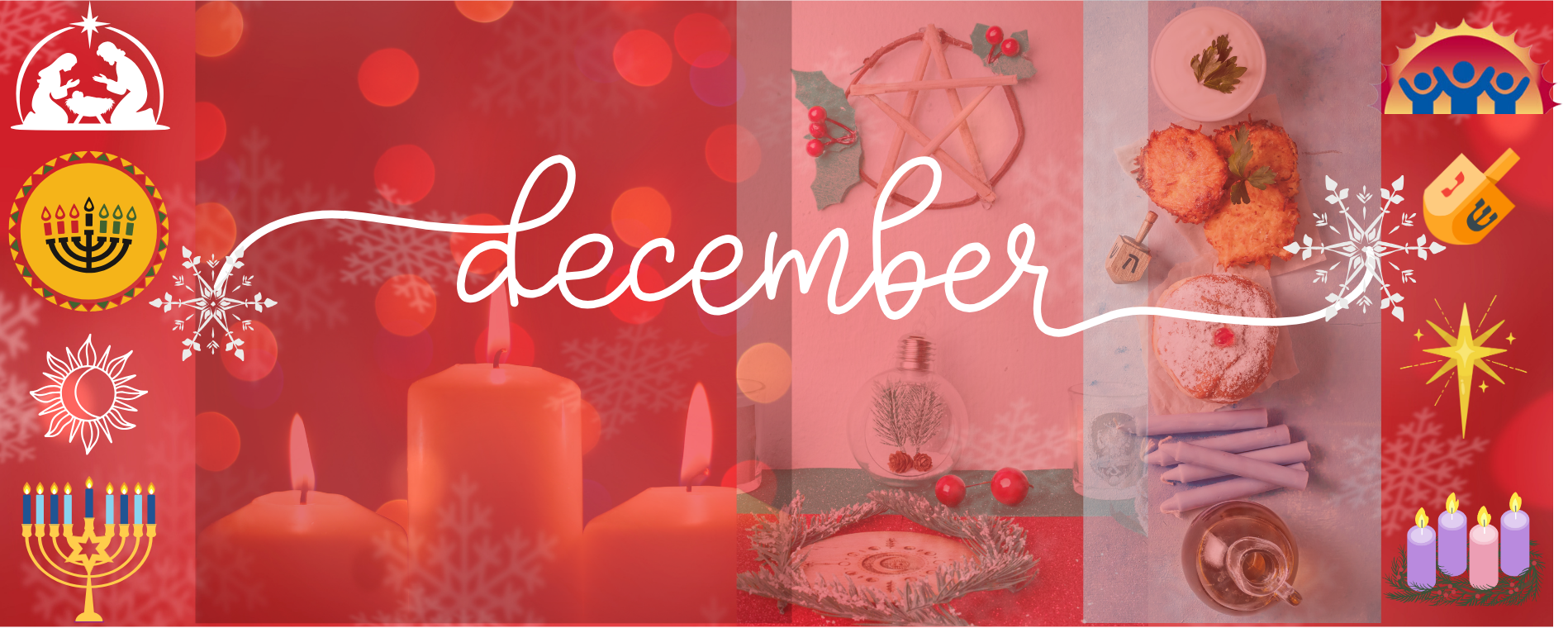Religious, Secular, and Spiritual Identity (RSSI) Observances in December
When we say "Happy Holidays," it's to honor the diverse traditions, cultures, and identities around us that enrich our shared human experience. December is a month brimming with observances, each unique and deserving of acknowledgement. From the familiar glow of Christmas to the vibrant celebrations of Hanukkah and Kwanzaa, and beyond to lesser-known observances like HumanLight and Las Posadas, this month invites us to explore, appreciate, and celebrate the diverse ways in which people around the globe mark significant moments and values.
Note - I tried to give a little context for each of these - not intended to be full explanations of these holidays and observances. Many traditions are complex and celebrated differently across cultures and individuals & families. I encourage you to research a bit and learn more about each of these. This may also not be a comprehensive list - please let me know if there is a tradition missing, or if there is something that I misinterpreted or simply got wrong. Also note that dates may vary depending on the calendar used.
Advent - Christian - begins on the 4th Sunday before Christmas - Commemorating the Christmas Season and in spiritual preparation for the coming of Christ (Christmas Day). Observance includes prayer, penance, sacrifice, and spiritual reflections. Each Sunday with intentional prayers and reflections for that week, adherents light a candle of the Advent Wreath; three are purple, and lit on the first, second, and fourth Sundays of Advent. Purple is the traditional color of Advent. The fourth candle is pink, and lit on the third Sunday of Advent or Gaudete Sunday, to represent joy as Christmas Day approaches. Sometimes a white candle is also lit on Christmas Day.
Asara B'Tevet - Jewish - Typically falls on or around Dec 22 - Observed as a day of fasting, mourning, and repentance in observance of the death of Ezra, the leader who brought some Jews back to the Holy Land from the Babylonian exile and who ushered in the era of the Second Temple.
Bodhi Day - Buddhist - Dec 8 - commemorates the day that Siddhartha Gautama became the Buddha. Celebrations often includes attending a religious service. Bodhi Day tends to be a quiet observance, with meditation, chanting and remembrance, rather than lavish festivities. Some families decorate ficus trees inside the home, with multicolor lights which can be a symbol of enlightenment.
Boxing Day (Also, St. Stephen's Day) - Christian - Dec 26 - Originated in the United Kingdom as a day to give gifts to the poor. Observances may include include giving to charity, attending or watching sporting events, leaving a large tip, or shopping for deals. The name comes from the Christmas Box, gifts or gratuities traditionally given to tradespeople, employees, etc.
Christmas - Christian - Dec 25 - commemorates the birth of Jesus Christ. Countries around the world celebrate differently and incorporate different traditions, such as caroling in the U.S., gift exchanges with neighbors and fireworks in Argentina, heading to the beach in Australia, or gifting apples in China. Many Christmas traditions include decorating a tree with lights and ornaments, hanging stockings by the fireplace, gift exchanges and feasting with friends and family.
Chanukah / Hanukkah - Jewish - Timing Varies - observed for eight days and nights. It celebrates the victory of Maccabee over King Antiochus (he forbade the practice of Judaism). A candle is lit on the menorah each night of Hanukkah. Families exchange gifts, sing songs, recite prayers and play games. Latkes (potato pancakes) are a traditional dish eaten during the celebrations.
Feast of the Immaculate Conception - Catholic - Dec 9 - This feast occurs during the liturgical season of Advent (relating to the birth of Jesus), this feast commemorates Mary's being born without original sin so that she could be a fit mother for Jesus Christ. Observances include masses, recitation of the rosary, feasting, and eating white food.
Feast of Our Lady of Guadeloupe - Catholic - Dec 12 - commemorates the Virgin Mary, Mexico's patron saint (also referred to at the Lady of the Americas) appearing to a peasant in 1531. Observances may include singing, dancing, and feasts, and placing flowers by an image or icon of Mary.
Holy Innocents Day (also Childermas or El Día de Los Santos Inocentes) - Christian - Dec 28 - commemorating the children slain by Herod after he had been told by the Magi of the birth of a king of the Jews. Observances may include special masses and processions and prayers for the protection of children and strength in defending the vulnerable. Some places include child-like pranks (similar to April Fools Day).
HumanLight - Humanist / Secular - Dec 23 - celebrating and expressing positive human values, such as reason, compassion and hope, the HumanLight holiday has a vibrant and authentic meaning for Atheist, Humanist, and other Secular Identities (AHoSI). Celebrations may include community events / festivals, feasts, volunteer activities, and celebrating the 10 Commitments or Values of Humanism. Many light three candles representing reason, compassion, and hope.
Kwanza - Secular/Cultural - Dec 26 - Jan 1 - honors African heritage. During this time, friends and family exchange gifts and light a series of black, red, and green candles. Celebrations include feasting with friends and family, storytelling, African drumming, songs, and dance.
Las Posadas - Christian - Between Dec 16 and 24 - Celebrated to commemorate the journey of Mary and Joseph to Bethlehem. Festivities include prayers, food, music, fireworks, and piñatas. This tradition originated in Spain and is celebrated in Mexico, Latin America, and some other places around the world.
New Year's Eve - Secular - Dec 31 - celebrated by many around the world in celebration of the new year on January 1. Festivities often involve feasts, acknowledgment of regrets and anticipations for the year to come, and public gatherings to count down the New Year. Remember that some cultures and religions follow the lunar calendar and thus observe New Years on days other than January 1st.
Saint Nicholas Day - Christian - Dec 6 - Nicholas of Myra was known for his generosity through a Christian legend, in which he gave a poor father money in order to prevent his daughters from being taken into slavery, as the father did not have the funds for his daughters' dowries. It is said that Nicholas threw the money through the family's window, which landed in their shoes, which were drying near their fireplace. In observance, children leave their socks or shoes out to be filled with treats or gifts. The tradition of Santa Claus bringing gifts emerged from this tradition.
Saint Stephen's Day - Christian - Celebrated on the second day of Christmastide honoring St. Stephen, considered to be the first Christian martyr. See Boxing Day.
Saturnalia - Ancient / Pagan / Roman - Originated as Roman festival to honor Saturn, the Roman god of farming and the harvest. Some traditions of Saturnalia, in addition to those of Yule, helped shape the Christmas traditions we see today.
Sol Invictus - Pagan (ancient), Satanism - Dec 25 - The name comes from festival Dies Natalis Solis Invicti ('birthday of the Invincible Sun') which was celebrated on Dec 25th, the day of the Winter Solstice on the Roman Calendar. Observed today by the Satanic Temple, it is a celebration of being unconquered by superstition and consistent in the pursuit and sharing of knowledge. Festivities may include feasts, candle lightings, mass, and de-baptismal or de-confirmation ceremonies.
Twelvetide (Also Christmastide) - Christian - Dec 25 - Jan 5- Twelve Days of Christmas, also known as Twelvetide, beginning Christmas Day and ending on the 5th of January, with the last day being Twelfth Night (Epiphany Eve). The day after Epiphany is Distaff Day (the day of returning to everyday work routines).
Winter Solstice (Hibernal Solstice) - Pagans, Wicca, AHoSI, and many cultures around the world - occurs during the hemisphere's winter. In the Northern Hemisphere, this is the December solstice (December 21, December 22, or December 23) and in the Southern Hemisphere, this is the June solstice (June 20, June 21, or June 22). - this is the shortest day of the year marking the end of the descent into darkness and the beginning of the return of the light as the days begin to get longer after the solstice. A time for new beginnings and spiritual re-birth. Celebrated within the tradition of Yule.
Yule / Yuletide - Pagans, Wicca, and many cultures around the world - 12 days between the winter solstice and the beginning of the next solar year. Celebrated by feasts including a Yule cake, decorating with wreaths and decorating a tree with lights and festive ornaments, burning a Yule log.
Other December Observances
These are a few - visit the National Day Calendar for more!
- Dec 1 - World Aids Day
- Dec 1 - Rosa Parks Day
- Dec 2 - International Day for the Abolition of Slavery
- Dec 2 - National Special Education Day
- Dec 3 - International Day of Persons with Disabilities
- Dec 4 - World Wildlife Conservation Day
- Dec 5 - International Volunteer Day
- Dec 6 - National Day of Action and Remembrance of Violence Against Women
- Dec 7 - National Pearl Harbor Remembrance Day
- Dec 8 - Pansexual Pride Day
- Dec 10 - International Human Rights Day
- Varies (First day of Winter) - National Homeless Persons Remembrance Day
- Dec 23 - Festivus
- Dec 28 - Pledge of Allegiance Day
- 11:30 PM on December 31st to 12:30 AM on January 1st - Universal Hours of Peace


